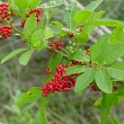 |
Exotic Plant Management at the Park:
There
are a number of
exotic
plants on the island, the most noticeable being the Brazilian pepper,
which is extremely
fast growing and competitive, destroying native habitats very quickly.
Its rapid, sprawling growth pattern allows it to cover large areas of
ground
in a short time. The heavy shade and tangled branches virtually
eliminate
understory and nearby native plants. Brazilian pepper does not suffer
much
in prescribed burns. Birds readily redistribute the seeds, contributing
to an ongoing problem. Other exotics which are managed at the park
include Cogon Grass, Rosary Pea, and Australian Pine. Lantana is also
exotic and somewhat invasive, but is currently not a major target for
control here at Honeymoon Island.
Invasive plants not only
keep native plants from flourishing, but remove the source of food and
shelter needed by native animals. The park removes non-native
plants in a program that may require three laborious steps, depending on
the plant:
By completing one or more of
the following steps, an area can be returned to
its optimal natura environmental condition in which the native plants and animals
can grow again and regain dominance.
Ways to Control Exotic Plants: - Remove the plant physically
- Gather and remove seeds
- Apply herbicide directly to plant
- Fire, either natural or prescribed
|